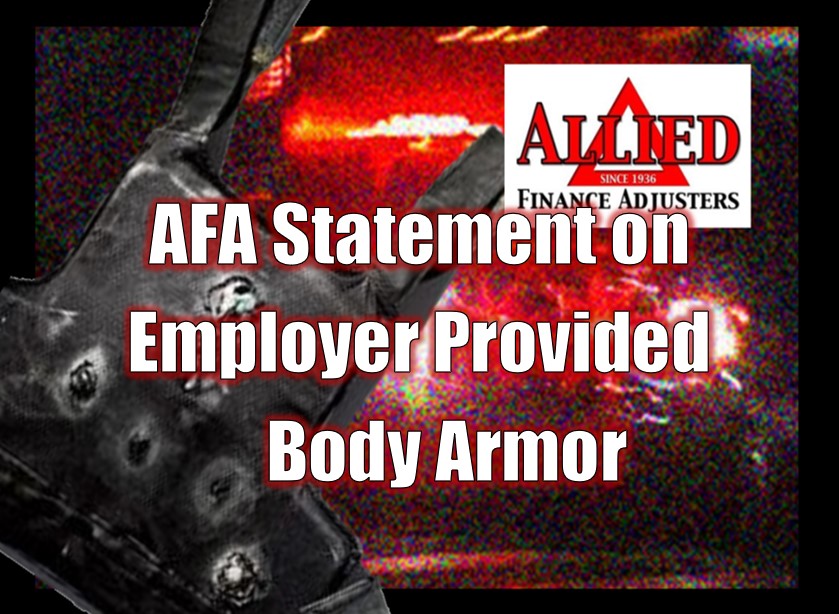AFA Statement on Employer Provided Body Armor
Last Wednesday in the “Murder in the Field, What Can We Do?” Editorial, I threw out the proposal that perhaps agencies should begin issuing staff body armor. Before you do, there are a number of things to consider as are provided by Allied Finance Adjusters legal counsel Machelle Morris, which she presented to the AFA at REPO22.
United States Code, Title 18, Chapter 44, Section 931 – Makes it unlawful for a person to purchase, own or possess body armor if that person has been convicted of a felony crime of violence under federal, state, maritime or territorial laws unless that person obtains prior written certification from his/her employer that body armor is necessary for the safe performance of a lawful business activity and that person’s use of the body armor is limited to the course of such business activity.
The Occupational Safety and Health Administration Regulation 1910.132 requires that the employer make a workplace hazard assessment and certify whether the “hazards of processes” or “environment encountered” is capable of causing injury or impairment in the function of any part of the body…by physical contact. The certificate has to be kept on the employer premises. If the employer determines that the answer to any part of this questions is “yes”, the employer must require, provide and maintain personal protective equipment for the affected employees.
Unless the personal protective equipment is “ordinary clothing” (such as steel toe boots that can be worn while doing work and non-work activities), the employer has to pay for it and cannot allow it to be worn outside of work. Even if the employee pays for or provides the personal protective equipment on their own, the employer is still responsible for seeing that it is properly used, maintained, and does not become out of repair.
My research resulted in finding an OSHA guidance paper about employer-required body armor that was sent to an employer in 2013 when the New York business asked whether the OSHA regulation requiring Personal Protective Equipment for employees applies to bullet or stab resistant vests or other body armor.
In the 2013 OSHA guidance letter, the agency states that if the employer has determined that the work process or environment is hazardous in a way that makes bullet or stab resistant vests appropriate as personal protection equipment, it would definitely fall into the conditions of regulation 1910.132. OSHA considers equipment or clothing such as body armor to be a proper response to the hazard, and that it is not considered “ordinary clothing”.
This means body armor that is adequate to protect against gunshot wounds and knife stab wounds must be provided by the employer to all affected employees (including making sure the body armor provided properly fits the employee), paid for by the employer, required for work by the employer, maintained and sanitized by the employer. Employees must be fully trained on the proper use of body armor by the employer. It must be against the rules of work for anyone to wear company body armor outside of work.
As of now, 2022, the rules and regulations have not changed. What has changed is the environment into which some repossession employees are sent. If you have determined that, in your employee’s jobs hazards are present, or are likely to be present, which necessitate the use of body armor to keep them safe, then it is time for you, as their employor, to go all-in on providing and requiring body armor for every employee that drives a tow truck (or whatever the trigger is for this danger).
The written policies should mirror the written policies for issuing a laptop or other company property. Proper fit and proper training will be the biggest issues in incorporating the use of body armor into the on-boarding process, but it must be done if your geographical area has become dangerous enough to warrant the use of body armor.
Each state has its own laws about who can own body armor and where it can lawfully be worn. Remember that state laws can be more restrictive than federal law, but cannot take away restrictions set by federal law.
Almost every state has a law making it illegal to wear body armor during the commission of a crime. Some states regulate where body armor can be worn. For example, in Louisiana it is illegal for anyone to wear body armor on a school premises and in Topeka, Kansas a city ordinance makes it illegal for body armor to be worn during a protest, parade, rally or demonstration. Some states regulate to whom and where retailers can sell body armor. In Connecticut it is illegal to buy or sell body armor online or in any manner that does not include a face-to-face transaction. In Maryland, an actual state permit is required for anyone previously convicted of a felony or drug offense to buy or possess body armor.
(I have copies of state law summaries available for anyone interested to view.)
Machelle Morris
Attorney at Law
Allied Finance Adjusters
AFA Statement on Employer Provided Body Armor – AFA Statement on Employer Provided Body Armor – AFA Statement on Employer Provided Body Armor – AFA Statement on Employer Provided Body Armor
AFA Statement on Employer Provided Body Armor – Repossess – Repossession – Repossession Agency – Repossessor – Repossession Violence – Repossession History – Allied Finance Adjusters – AFA












More Stories
Rising Fuel Costs Are Impacting Repossession Operations
Colorado Bill Aims to Severely Impact All Repossession Operations
Today is Fallen Agents Day – 2026
The Fallen 2026
From Auction Cutting to Field Programming: The Structural Shift No One Budgeted For
Bad Apples in the Repossession Industry